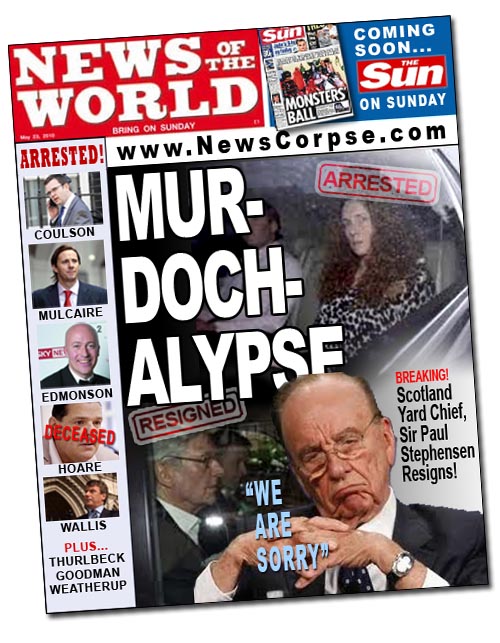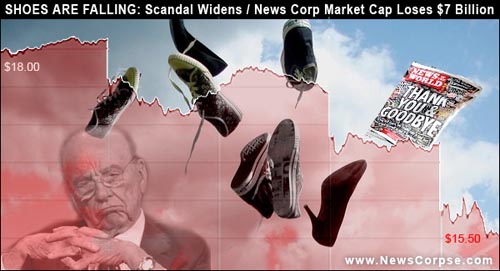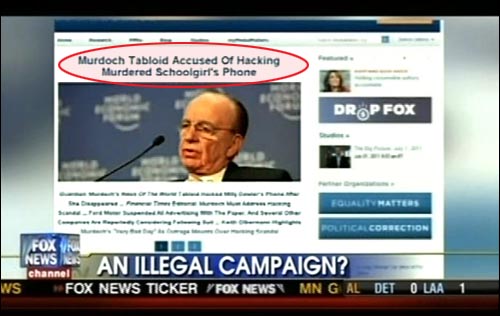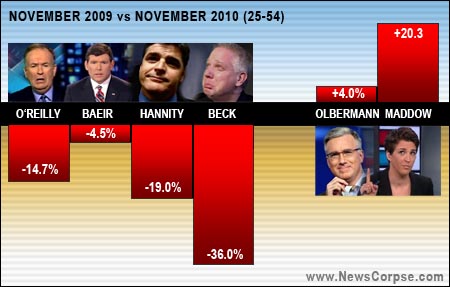 Perhaps we shouldn’t be surprised, but Rupert Murdoch’s Wall Street Journal has published a self-serving op-ed that seeks to separate itself from the travails of its corporate parent, News Corp. The Journal argues that anyone who thinks there is any carryover from the UK scandal is overreaching. Never mind that the head of the Journal’s Dow Jones division, Les Hinton, was carried over to the states from his British perch at News International and has already resigned as a result of his association with the disgraced enterprise.
Perhaps we shouldn’t be surprised, but Rupert Murdoch’s Wall Street Journal has published a self-serving op-ed that seeks to separate itself from the travails of its corporate parent, News Corp. The Journal argues that anyone who thinks there is any carryover from the UK scandal is overreaching. Never mind that the head of the Journal’s Dow Jones division, Les Hinton, was carried over to the states from his British perch at News International and has already resigned as a result of his association with the disgraced enterprise.
The op-ed takes a decidedly arrogant approach in suggesting that they, for some unexplained reason, are above it all and should not be tarnished. They regard the whole affair as a legal matter that is limited to the UK and that the real problem is the malfeasance of Scotland Yard for not properly investigating the crimes involved. The Journal’s editorial conveniently leaves out any mention that part of the problem with the police investigation is that they were on the receiving end of bribes from News Corp.
The only thing more grating than their arrogance is their victimehood. Apparently the only controversy is that the rest of the media world is ganging up on the long-suffering Wall Streeters and their bosses:
“It is also worth noting the irony of so much moral outrage devoted to a single media company, when British tabloids have been known for decades for buying scoops and digging up dirt on the famous. Fleet Street in general has long had a well-earned global reputation for the blind-quote, single-sourced story that may or may not be true.”
It’s not only Fleet Street. The “blind-quote, single-sourced story that may or may not be true,” is the standard operating procedure for Fox News. But why is the Journal so surprised about the moral outrage devoted to News Corp when it, so far, is the only party accused of hacking into people’s phones? And it is the only party, so far, accused of bribing the police for dirt on the famous. By the way, that is very different than the practice of “buying scoops” from private sources that the Journal is attempting to conflate with paying off the police.
The obvious attempt to muddy the discussion continues when the Journal addresses the critical of issue of relationships between politicians and the press:
“The British politicians now bemoaning media influence over politics are also the same statesmen who have long coveted media support. The idea that the BBC and the Guardian newspaper aren’t attempting to influence public affairs, and don’t skew their coverage to do so, can’t stand a day’s scrutiny.”
Here is where the op-ed deliberately tries to steer away from the real problem. Even if we were to concede that the BBC and the Guardian seek to influence public affairs through their coverage, the activities that are being “bemoanded” are those where News Corp seeks influence through intimidation and/or alliance with politicians, not via their reporting (which, of course, they do as well).
Next we see the editorial take another stab at victimhood with an unusual kicker aimed at a favorite bogeyman of News Corp, Julian Assange.
“We also trust that readers can see through the commercial and ideological motives of our competitor-critics. The Schadenfreude is so thick you can’t cut it with a chainsaw. Especially redolent are lectures about journalistic standards from publications that give Julian Assange and WikiLeaks their moral imprimatur.”
First of all, I don’t know of any mainstream news organization that has given WikiLeaks their moral imprimatur. For the most part Assange has been roundly castigated and, so far as Fox News is concerned, he is regarded as a traitor who should face a firing squad. But the Journal is being stunningly hypocritical in that they themselves have adopted the Wikileaks model in an attempt to emulate its success. That is the express mission of the Journal’s Safehouse web site. Unfortunately, there is nothing safe about Safehouse, which does little to protect one’s anonymity. So unless you have some perverse desire to be ratted out, arrested, or sued, stay as far away from this un-Safehouse as possible.
Finally, the Journal launches into a defense of allegations that the U.S. could prosecute News Corp under the Foreign Corrupt Practices Act. But somehow they spin off such a prospect into an attack on their First Amendment rights. The implication is that any prosecution of a media entity for any crime whatsoever violates the Constitution. That’s a rather broad reading. The Journal complains that…
“Applying this standard to British tabloids could turn payments made as part of traditional news-gathering into criminal acts. The Wall Street Journal doesn’t pay sources for information, but the practice is common elsewhere in the press, including in the U.S.”
Is the Journal asserting that payoffs to police officials is an act of “traditional news-gathering?” In most places that’s a violation of law enforcement ethics and it is the reason that the commissioner of Scotland Yard resigned yesterday.
Moreover, the Journal’s closing argument is that the pursuit of criminal activity on the part of the press has, in the past, netted individuals who were not initially suspects. The example given in the editorial is that of Robert Novak who had participated in the outing of CIA operative Valerie Plame. The Journal notes that others, including reporters at the New York Times, were swept up in the scandal. So What? That’s wonderful! Is the Journal suggesting that the press should keep its collective mouths shut because they might get drawn in themselves? That would be the duty of an honest, ethical press. Report the news – the truth – regardless of self-interest.
It’s as if the Journal is threatening its rivals to stay out of this mud fight lest they get dirty themselves. Really? That’s their defense?



 Much of the world is presently learning what a despicable old plutocrat Rupert Murdoch is. The
Much of the world is presently learning what a despicable old plutocrat Rupert Murdoch is. The  It’s time to stop Murdoch from raiding the American treasury. He is the poster fogey for decrepit oligarchs. He is using money that rightfully belongs to the citizens of the United States to finance campaigns against Media Matters; to disseminate propaganda via Fox News, the Wall Street Journal, etc.; to promote right-wing candidates and issues; to bankroll AstroTurf Tea Party groups; and now, to hack into the phones of kidnapped schoolgirls and victims of terrorism on both sides of the Atlantic.
It’s time to stop Murdoch from raiding the American treasury. He is the poster fogey for decrepit oligarchs. He is using money that rightfully belongs to the citizens of the United States to finance campaigns against Media Matters; to disseminate propaganda via Fox News, the Wall Street Journal, etc.; to promote right-wing candidates and issues; to bankroll AstroTurf Tea Party groups; and now, to hack into the phones of kidnapped schoolgirls and victims of terrorism on both sides of the Atlantic.


